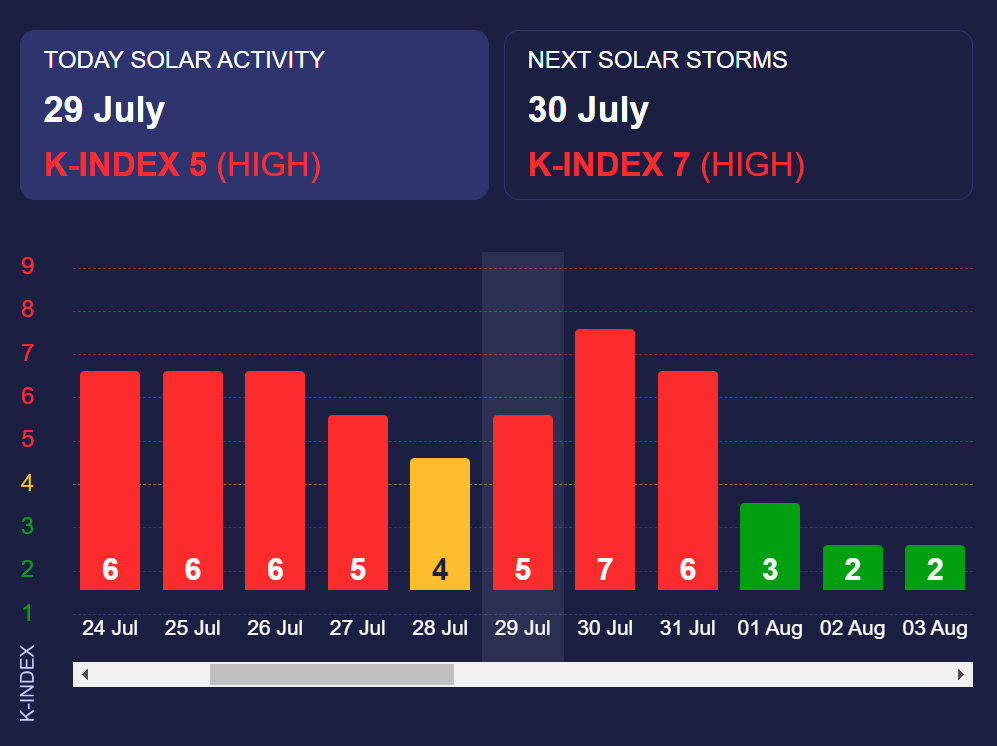Earth bracing for intense geomagnetic storm: How to protect your health
 Intense geomagnetic storm is approaching Earth (collage by RBC-Ukraine)
Intense geomagnetic storm is approaching Earth (collage by RBC-Ukraine)
The last days of July will be very difficult for people sensitive to weather changes and those who react to geomagnetic storms. According to specialists, a powerful storm with a K-index 7 will hit the Earth on July 30-31, according to Meteoagent.
What is a geomagnetic storm
Flares and explosions regularly occur on the Sun, releasing a large amount of solar energy into space. This energy consists of charged particles - protons and electrons - that can quickly travel through space. When they reach the Earth's magnetosphere, activity occurs, which scientists call a magnetic or solar storm.
All magnetic storms are classified based on their strength, K-index, and other parameters. The higher the K-index, the more powerful the geomagnetic storm. Storms with a K-index 5 or higher are marked as red-level storms. Red-level storms can cause health deterioration in people, and disrupt communications, satellites, and GPRS.
Information about the geomagnetic storm
According to satellite systems NOAA, TESIS, and international meteorological laboratories worldwide, a red-level storm with a K-index 5 hit Earth on Monday, July 29. However, by Tuesday, this storm will become more powerful, reaching a K-index 7.
On Wednesday, July 31, the storm will weaken slightly but will still impact human activities. Scientists predict it will maintain a K-index 6, which is also a red-level storm.

Geomagnetic storm July 30-31 (screenshot)
How a geomagnetic storm affects people
Scientists around the world have conducted numerous studies on the connection between geomagnetic storms and human well-being. There is substantial evidence that during red-level storms, many people experience certain symptoms:
- Headaches, migraines
- Weakness, increased fatigue
- Daytime sleepiness, nighttime insomnia
- Reduced concentration
- Mental fog
- Decreased work capacity
- Blood pressure fluctuations
- Cardiovascular issues
- Mood deterioration
- Increased anxiety
- Irritability
- Aggressive behavior
- Exacerbation of chronic diseases
How to reduce the impact of a storm
Doctors advise reducing physical and emotional stress on days with strong geomagnetic storms, resting more, and maintaining a regular daily routine.
Additionally:
- Get a full night's sleep (7-9 hours)
- Do morning exercises and take contrast showers
- Eat well
- Drink enough water
- Avoid excessive coffee, energy drinks, tobacco, alcohol, and unhealthy food
- Ventilate rooms
- Spend time outdoors
- Consult a doctor if health worsens
Earlier, we discussed the causes of morning headaches.
This material is for informational purposes only and should not be used for medical diagnosis or self-treatment. Our goal is to provide readers with accurate information about symptoms, causes, and methods of detecting diseases. RBС-Ukraine is not responsible for any diagnoses that readers may make based on materials from the resource. We do not recommend self-treatment and advise consulting a doctor in case of any health concerns.

